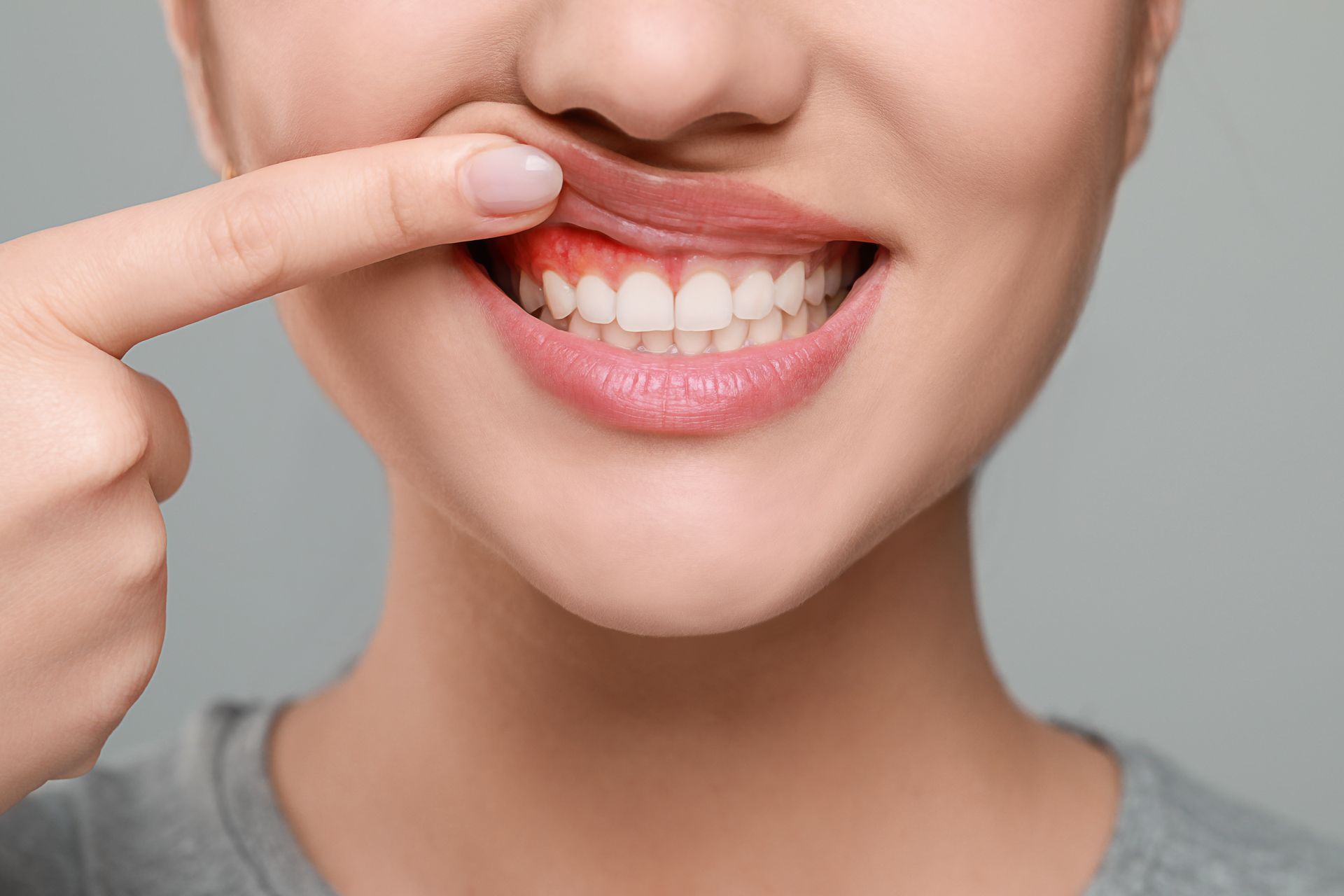Gingivitis
What is Gingivitis
Gingivitis is an inflammatory condition that affects the gum tissue around the teeth. It is the most common and least severe form of periodontal disease, usually caused by a build-up of plaque and tartar on the surface of the teeth and gums. Although it is reversible, if not treated properly, it can develop into periodontitis, a more serious condition.
Possible Symptoms
Redness and swelling of the gums
This is one of the first signs. Healthy gums have a pinkish appearance, but when inflamed, they become reddish and may show a slight increase in volume due to the accumulation of inflammatory fluids.
Bleeding when brushing or flossing
Inflammation makes the gum tissues more fragile, causing frequent bleeding, even with light stimuli such as brushing or flossing.
Persistent halitosis
The accumulation of plaque and food debris, together with inflammation, can generate continuous bad breath, also known as halitosis.
Mild gum recession
In some cases, inflammation can lead to recession of the gums, exposing part of the root of the teeth and making them more susceptible to tooth sensitivity.
Sensitivity of the gums to touch
This can cause discomfort or even pain when pressing or brushing the affected area, due to the increased sensitivity in the inflamed region.
Available Treatments
Improved oral hygiene
Maintaining regular and effective oral hygiene is essential to reversing the condition. This includes brushing your teeth at least twice a day with a soft-bristled toothbrush and fluoride toothpaste. Flossing daily is also essential to remove food debris and plaque in areas that the toothbrush cannot reach.
Dental prophylaxis
A professional cleaning by a dentist or oral hygienist is essential to remove tartar (hardened plaque) that has accumulated on the teeth and below the gum line. This procedure reduces inflammation and facilitates regeneration of the gum tissue.
Correction of supporting factors
It's important to treat conditions that contribute to gingivitis, such as untreated tooth decay, compromised dental restorations or ill-fitting dentures. These adjustments help prevent the inflammation from recurring.
Our Clinical Team is here to help you!
Agreements and Partnerships
FAQ's
1 Can this condition be stopped by brushing the teeth alone?
Yes, in the early stages, it can be reversed with a rigorous oral hygiene routine, including proper brushing and daily flossing. However, it is important to consult a dentist for professional oral hygiene and specific guidance.
2. Are mouthwashes effective in treating gingivitis?
Antibacterial mouthwashes, such as those containing chlorhexidine, can help reduce bacteria and inflammation. However, they should be used as a complement and not as a substitute for brushing and flossing.
3. Does gingivitis always cause pain?
Not always. Many people with this condition don't feel pain, but they may notice symptoms such as swelling, redness or bleeding gums.
4. Can smoking make gingivitis worse?
Yes, smoking is one of the main aggravating factors, as it reduces the healing capacity of the gum tissue and increases the risk of it developing into periodontitis.
5. How long does it take to treat gingivitis?
With proper treatment and improvements in oral hygiene, it can begin to regress in a few days or weeks. The time varies according to the severity of the case and the patient's commitment to the dentist's recommendations.
6. Can children get gingivitis?
Yes, gingivitis can affect people of all ages, including children, especially if they don't have proper oral hygiene habits.
7. What foods help prevent it?
Foods rich in vitamin C, such as oranges and kiwis, contribute to healthy gums. Fibrous vegetables, such as carrots and celery, are also beneficial as they stimulate saliva production and help clean teeth naturally.
8. Can gingivitis cause tooth loss?
Not directly. However, if left untreated, it can develop into periodontitis, a condition that can cause bone loss and eventually premature tooth loss.
9. Can stress make gingivitis worse?
Yes, stress can compromise the immune system, making it harder for the body to respond to the bacteria responsible for causing it.
10. Can I treat gingivitis at home without going to the dentist?
Although oral hygiene habits are fundamental, a visit to the dentist is essential to remove tartar and assess possible complications. Home treatment alone may not be enough in moderate or severe cases.
11. Does pregnancy increase the risk of gingivitis?
Yes, hormonal changes during pregnancy can increase gum sensitivity and the risk of gingivitis, a condition called ‘gingivitis gravidarum’.
12. Is it possible to prevent gingivitis completely?
With proper oral hygiene, regular visits to the dentist and a balanced diet, it is possible to significantly reduce the risk of developing this condition.
Our Clinical Team is here to help you!







